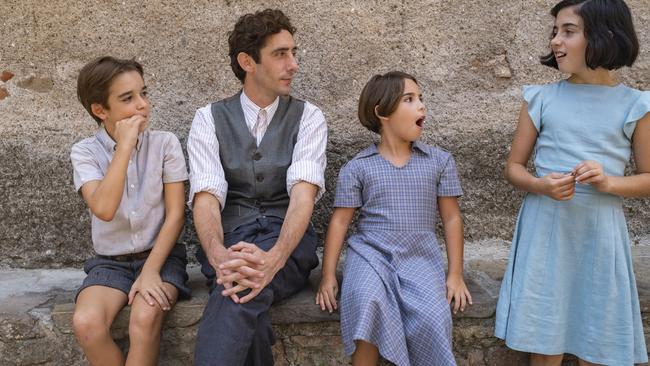The Teacher Who Promised the Sea: This film is a joy, despite such sadness
The Teacher Who Promised the Sea puts Spain’s civil war history smack bang in our faces and asks us not to look away.

The drawn-from-life drama The Teacher Who Promised the Sea is a sad film full of beautiful moments. It’s the occasional beauty that makes the overall sadness close to overpowering.
This historical drama, directed by Patricia Font and written by Albert Val, focuses on one year in the life of Catalan schoolteacher Antoni Benaiges. The source material is a 2012 nonfiction book by Francesc Escribano.
The story is told in two connected time frames. In 1935, Benaiges (Enric Auquer) arrives at a village in southern Spain where he has been appointed schoolmaster. He has an unorthodox education plan, telling the students to call him by his first name and sit anywhere they like. In this sense, the story has similarities with the Mexico-set Radical, which I reviewed on June 1.
He brings a printing press and lets the students create their own books. He asks them to write about their “dreams, desires, fears”. When he learns none of them has seen the sea, he has them write a book, The Sea: Pictured By Children Who’ve Never Seen It. He then promises to take them to the sea.
However, with the Spanish Civil War looming, his unusual teaching methods, adopted from the French pedagogue Celestin Freinet, are soon the least of his problems. He is an atheist – he removes the crucifix from the schoolroom wall, to the displeasure of the local priest – and writes articles for a left-wing newspaper, to the discomfort of the mayor.
The second time frame, in 2010, sees a young woman, Arianna (Laia Costa), travelling to the area where Benaiges taught after learning of the exhumation of a mass grave from the widespread summary executions carried out during the civil war. She thinks her great-grandfather’s remains may be there.
She is shown a map of Spain on which red dots note exhumed grave sites and green dots mark believed ones yet to be exhumed. It is stark viewing.
At the grave site, she meets a local, Emilio (Ramon Agirre), who says his teacher, Antonio Benaiges, may also be interred there. She soon learns of further links between the teacher and her family.
The segues between the classroom in 1935 and some of the now old students in 2010 are wonderfully done. It’s a glimpse of how fast a life can go; one moment a child, the next a senior citizen.
The beautiful moments happen in each time frame, such as when the teacher reads a story a boy has written to his illiterate father, or when a school inspector tests the students, and when Arianna tells her grandfather, who refuses to talk about the past, what she found in his father’s village.
One of the strengths of this film is that it doesn’t present itself as a mystery. Arianna quickly learns her family’s past. We see what befalls the teacher, a kind and gentle young man who only cared about helping children, as Spain moves into civil war.
This historical drama puts the history smack bang in our faces and asks us, unlike the priest and the mayor, not to look away.
The Teacher Who Promised the Sea (M)
Spanish and Catalan language with English subtitles
105 minutes
In cinemas as part of the Spanish Film Festival, which opens on June 11
★★★★




To join the conversation, please log in. Don't have an account? Register
Join the conversation, you are commenting as Logout